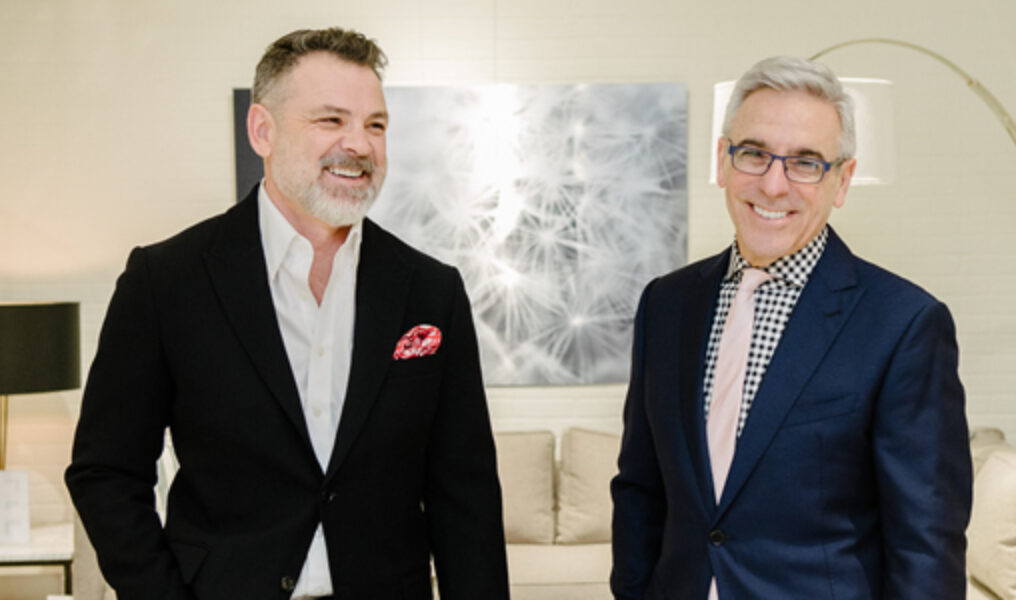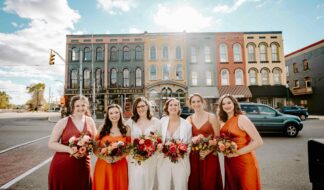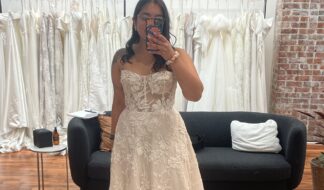by Joey DiGuglielmo
It's a Monday morning and Mitchell Gold and Bob Williams, the visionaries behind the Taylorsville, N.C.-based, eponymous company that bills itself as "classic modern home furnishings," are looking at another long work week ahead but excited about the weekend's events.
It happens to be the day after Pete Buttigieg announced his presidential campaign and Gold especially is excited.
"I think he's really terrific," Gold, 68, says. As a long-time outspoken proponent for LGBT rights and author of the book "Crisis: 40 Stories Revealing the Personal, Social and Religious Pain and Trauma of Growing up Gay in America," Gold's enthusiasm is not surprising.
"I think when he first came on the scene I was kind of dismissive," Gold says. "Oh, this is some gay guy from the Midwest, he's mayor of a small town, you know, who does he think he is? But the more I saw him, especially on a CNN town hall, for me what he's doing is challenging anti-LGBT evangelicals, the Mike Pences of the world. … In my wildest dreams as a kid, I would never have thought yesterday would happen so I was really touched by it."
The occasion is the 30th anniversary of Mitchell Gold+Bob Williams and a lot has changed since the Blade profiled the men (Williams is 57) and company, long-time business partners and at one time romantic partners as well, on its 25th anniversary five years ago. It's been a season of significant growth.
Five years ago, they had about 700 employees. It's near 1,000 now. The majority are full time. Then they had 17 stores. There are now 33. The most recent opened last year in Fort Worth, Texas. Their headquarters five years ago was about 600,000 square feet It's now close to 1 million. Sales have doubled in that time as well to about $230 million for all their holdings, which include a contract business that sells to hotels and an office supply arm. For more information, visit mgbwhome.com.
They were chatty — Gold especially — during a 45-minute phone interview. Their comments have been edited for space.
What's going on these days with Mitchell Gold+Bob Williams? It sounds like a lot has happened since we last spoke.
MITCHELL GOLD: We are really working to position our company for the future to get the team really in order to take the company into the next decade and we're super optimistic because the style sense that we have, the modern sensibility, whether it goes to pure American modern or more of a traditional modern, really seems to resonate with a lot of customers.
How have trends changed from five years ago?
GOLD: We've had a lot of new competition in the last five years and a lot of our older competition has moved toward making more modern furniture. I think consumers have really moved toward the style sense we've had for well over 20 years.
BOB WILLIAMS: The other thing we've seen is color. Five years ago it was a lot more neutrals and a lot of it had to do with the 2008 recession. After about 2016, people were tired of that and wanted some freshness. That's the other big thing we've noticed.
Have you seen trends like that before over the years?
WILLIAMS: Yes, we saw it after 9-11. People were much more hesitant and conservative and not feeling as bold and colorful. It took a few years after that before we started seeing color back on the floor.
What does that say about our national psyche?
WILLIAMS? I think when things get tough and people don't feel secure, they get a little bit more reserved in their thinking and buying habits.
GOLD: Now things are a little chaotic and unsettling but I think what we're seeing is a lot of people want to be happy and as Bob often says, the colors that we do are happy colors.
What other national trends affect what you guys do? Over 30 years, for instance, the middle class in this country isn't what it was yet your sales are up. Has the one percent made up the difference?
WILLIAMS: I wouldn't say it's the one percent making up the difference. I would say it really depends on the mood of what's going on. People need to buy furniture no matter what's going on with the economy. They move into a new house, something's changed … so it's kind of a tricky situation.
GOLD: People in our community categorize us as aspirational luxury … and you'd be amazed how many people just starting out in their career tell me, "Oh, I bought a sofa from you, I waited 'til the floor sample was on clearance so I could get a price I could afford," or they bought something at more of an opening price point, all the way to people who are in charge of stuff like global retail for Nike. There are a lot more people at our more entry level price point who aspire to have our stuff and we try to make it available to them at different times of the year.
You had a spate of events at your various stores for your 25th anniversary. Are you doing that again for 30?
GOLD: We have a few. We just had one in New York with Elle Decor magazine that benefited the Tyler Clementi Foundation. Lady Bunny DJ'ed … she's fantastic. …We're doing a big event in September in our Beverly Hills store with Architectural Digest and in our Texas stores next week. So yes, we have things going on all over the country for the year.
What other causes are you passionate about besides LGBT ones?
GOLD: We work with the Sustainable Furnishings Council, an environmental group for the home furnishings industry. And Exodus Works, headed by Rev. Reggie Longcrier that helps homeless people get into their first apartments.
How do you decide where you'll open new stores?
GOLD: There are a lot of factors — what the household incomes are, what the education levels are, what the style sense is. We also try to cluster our stores in big markets because they do more business than you would get in a remote market and you get to take advantage of the efficiencies of having two-three stories in one market like in D.C., we have a store just down the street from you and also one in Tysons Galleria that really gives us the opportunity to cover a big part of the market. Another big factor is just what's available in commercial real estate. It's much different than residential. We really want to be in great locations, great buildings and have it be the right size for us so there are always four or five balls we have up in the air looking for the right place.
Will you open any more in 2019?
GOLD: No. We're working more on our website this year, then we will start back expanding in 2020.
Does your expanded headquarters space make up for more overall volume or are there other things you're doing there?
GOLD: It's mainly a factor of volume but we have a large distribution center now. We used to ship certain categories out of different locations but we've brought it all together to one distribution center and we took the other space and used it to expand our manufacturing abilities.
What are the downsides of so much growth? Are there headaches involved that the average person wouldn't think of?
GOLD: You have to do everything very carefully. One of the difficulties is hiring the right people, hiring them quickly …
WILLIAMS: Office space …
GOLD: … moving people around, we're going through that again. Every time you hire somebody, you have to have a space for them. Even though we try to have extra office space available, it never seems to be enough.
Five years ago, you estimated your employees were about 15 percent LGBT and clientele about 15-20 percent LGBT. Would you say those numbers have changed?
GOLD: Those are close enough I would say.
Mitchell, almost exactly a year ago you were on the cover of The Washington Post (Sunday) Magazine in a piece called "The Last Frontier for Gay Rights," and spoke of your work with the P.R.I.D.E. Club at a high school in your community. How was it received?
GOLD: The reaction was generally very good. … I got virtually no negative comments that I know of, to my face. The only disappointing thing was I wish the writer had focused a bit more on people who have changed their minds (on LGBT rights). She seemed a bit more focused on people who have dug in their heels, who still believe, quote-unquote, that homosexuality is a sin. There are people, whether they're evangelicals, Mormons or Catholics, who have started to change like Rev. Stan Mitchell in Tennessee or David Gushee in Atlanta … who stand up and say, "I don't believe it is a sin."
Do you feel the rate at which that is happening is encouraging or will we still be debating this in 20 years?
GOLD: Mayor Pete has the opportunity to create a seismic shift and he has that opportunity because he's willing to talk about it in a way that people understand, in a way that our LGBT advocacy groups don't talk about it. It's not enough to win an election or win a court case, we have to continue educating people and getting them to understand the harm they're doing to people … to understand why they have to change their voting habits.
Bob, do you follow these issues as closely as Mitchell?
WILLIAMS: Not quite as closely as Mitchell but my husband is on the board for OUTright Youth so I hear a lot of things that are going on because of him and also being out in the community, being a big part of that.
You listed the Sunbrella Collection in 2018 as one of your recent milestones. What's that?
WILLIAMS: That's a company that has been around for a long time and is really known for their outdoor fabric and for the longest time they've been trying to get in on the indoor market but their fabrics weren't quite soft enough. But they've finally found a way to re-engineer their yarn to have a softer feel and we're very excited to be part of their new indoor collection. It's easy to take care of. You don't have to worry about it staining.
Are buying trends any different in Washington than your other markets?
GOLD: The stuff in D.C. is very gay. No, I'm kidding (laughs). The only thing I'd say is maybe a larger amount of smaller pieces that might be sold because it's a city whereas in Tysons where the homes are bigger, not as much, but style wise it's very similar.
How about in Los Angeles?
GOLD: There's sort of a California casual yet dressier look. Maybe a little cleaner looking but still very modern. In D.C., maybe a little more traditional. We have three fantastic stores in L.A.
Would you like to retire someday?
GOLD: At some point I would like to work a little less. We have a search on now for a CEO to come in and transition and eventually take a lot of my responsibility.
WILLIAMS: One of the things we've been focusing on the last year is getting everything a little bit more organized for that day when neither of us are here.
GOLD: We're also searching for a chief marketing officer. That could be a pretty big opportunity for somebody.
Any other big changes since we last spoke in your personal lives?
WILLIAMS: I grew a beard, that's about it.
GOLD: I lost about 45 pounds and feel great.
How are your husbands and what do they do?
GOLD: Tim (Gold) is fostering at-risk puppies and cogs with the local Catawba Valley Human Society. He picks the appropriate dogs and trains them to be service dogs for kids or young adults with autism or other people in need. And Bob's husband Stephen (Heavner) is a painter and is very good.
WILLIAMS: He also does volunteer work and has sold some paintings. Not anything that expensive.
GOLD: But he's very good and he's sold things for prices above what I would have anticipated.
How is Mitchell Gold+Bob Williams different from Pottery Barn or Room & Board?
GOLD: We have a distinctly modern style sense, we have our own factor and we make higher quality and equality is important to us. We are a company that supports equality for everybody, not just in the things we say but in the organizations and politicians we support. In those other stores, when people go in and buy, they're buying from manufacturers that we know down South do not support politicians who honor equality. In fact, they have manufacturers that supported (anti-LGBT legislation) HB2 (the Public Facilities Privacy & Security Act) and politicians that had those in place.
How do you relax?
GOLD: I like "Law & Order" and "Seinfeld."
WILLIAMS: He watches the first eight minutes then falls asleep in the middle and wakes up at the very end and says, "Let's watch another." Then he falls asleep again. He never knows what's in the middle of any of those episodes.
GOLD: I love to read. On the weekends, Tim and I take the dogs on long walks.
WILLIAMS: We like taking short trips and discovering new things in North Carolina. We take advantage of that as often as we can.
This article originally appeared in the Washington Blade and is made available in partnership with the National LGBT Media Association.










